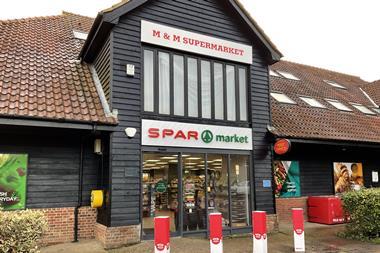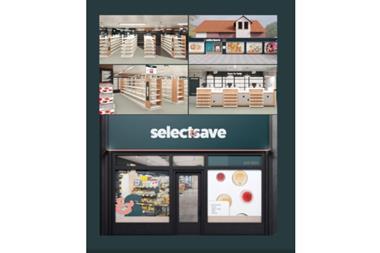Retailers discuss how they manage apprenticeship schemes, and reveal the benefits they provide employees and the business
When two members of staff left Nisa Pinkie Farm in Musselbrough, Scotland, to study for apprenticeships in a different sector, manager Colin Smith decided it was time to find out what he was missing out on. “It’s about helping to advance members of staff and keeping them in store, or at least in the industry,” he says. “I heard about the apprenticeship course through Excel Training. This way, employees can train on the job and the course is tailored to my business needs as well as getting the qualification.”
Nisa Pinkie Farm is now a Modern Apprenticeship employer, meaning that younger employees (aged 18-24) can get a Scottish Qualifications Authority-certified qualification in retail.
“You have to look at what you do with younger staff because they aren’t on the living wage,” says Colin. “What else can we do to improve their lives and motivate them? There’s a certain responsibility on the employer to be fair to them and ensure they can see a career path in front of them. This is a chance to say to any young employees ‘there are opportunities here’.”
Richard Dance, who owns a chain of Co-op stores in Southampton under the Welcome franchise, agrees that investing in apprenticeships can help to improve staff turnover. “It gives a colleague an extra buy-in as they have another benefit in the way of a paper qualification that they can always use in the future,” he says. He has encouraged staff across a range of ages and experience to train for NVQs. “We have had a lot of success with apprentices over the years and have our own local training provider, Fareport, that we work closely with.”
He claims that putting existing staff forward for apprenticeships enables the business to grow organically. “From an employer’s perspective we very much prefer to develop staff and promote from within rather than recruit from outside the business, as that involves extra bedding-in time and expense. Training and development within the business also allows us to succession plan and build the business culture that we want. Upskilling the team also has a positive operational effect and improves productivity.”
Studying for an NVQ in their workplace is very appealing for many, states Richard. “Our colleagues see the benefit of studying for qualifications as they can complete them while still earning a full wage and working it around their other life commitments,” he says. “It can also be studied without the need to travel. For a number of our colleagues, training has also turned retail into a career for them as they have grown in knowledge and confidence and brought the best out in themselves that might not have otherwise been discovered.”
One such employee is Jemma Bradshaw, manager at Woodcot Welcome Co-op in Gosport, who finished her NVQ level three in retail management last June. “You may as well carry on learning if you have an opportunity,” she says. “I’ve been made redundant twice in my life, so bettering yourself can only help in the future. Learning things at a higher level will make me think about the business in depth. Just passing the maths and English tests and computer-related exams boosts your confidence.”
In addition to feeling more confident, Jemma has also been able to use her skills to boost the business. “It made me more aware of the things I was doing right and also highlighted areas the store could improve on. I had to analyse stock control, so it helped me learn to do that more efficiently. It’s a lot more organised than it used to be now. It’s made me feel more confident, too. I had a good idea of how the business operates, but it’s given me greater clarity. I’m keen to do a degree in retail when time allows.”
Abbie Lippiatt, of Denvilles Welcome in Havant, has also used her new-found skills to improve the store since studying for an NVQ level two. “I learnt more about health & safety, diversity and food safety. It’s helped me to become closer to colleagues, too. I also learnt a lot about visual merchandising. I created a promotional bay, which resulted in an increase sales.
“When you learn about the business and you appreciate it more, you understand all the policies. It makes you a better supervisor - you are better placed to train others and answer their questions.”
Having the qualification also enabled Abbie to move up the career ladder. “I’d been at the company for under a year and I’d just become a supervisor. I thought if I had a qualification under my belt I could apply to be deputy manager, which I have achieved. Now I’m studying an NVQ level three in management.”
Chelsea Mills of Costcutter Minster in Sheppey, Kent, has also been promoted after achieving her NVQ. “Before, I was a cashier and now I manage the fresh produce section as a supervisor. I have another qualification on my CV, and I learnt lots of new things. I’m finding it really useful.”
Her colleague Lorraine Clulow is currently studying for her level three NVQ and has taken on more responsibilities since beginning her studies. “I’ve been here eight years and I really enjoy it. I now have my own area - the Pound zone - where I take charge of everything and manage the orders. I’ve passed an NVQ level two and I’m now part-way through my NVQ level three management course and have just passed my English and maths tests. I aim to go into management at Costcutter and hopefully the future is bright for me.”
The NVQ has opened her eyes to the operational side of the business, she says. “You realise the different side of ordering - it’s much bigger than just the store - there are other retailers and suppliers involved. I’d definitely recommend others study for an NVQ. It boosts your confidence and gives you an insight into how the store runs.”
Meanwhile, Costcutter Minster assistant manager Sheila Brender, who turns 60 this year, simply felt that further training would help to give her a new perspective. “I’ve been here for 18 years, but I wanted something to get the brain cells going. It’s made me see some things in a different light, such as how to handle staff, being more understanding of their views and needs. It changes your perceptions and you have more empathy.”
Colin at Nisa Pinkie Farm notes that his staff have become much more productive since starting their apprenticeships. “They’ve just completed a customer experience module so they put together a questionnaire which they carried out and then presented the results to me and the team,” he says. “They are now making a list of recommendations. They did the survey at different times of day to capture experiences in the morning, day and evening. It’s made me realise that we need to look at staffing in the morning as people queue for longer then. These shoppers haven’t tried the in-store prepared meals either, so we’re thinking we might do sampling in the morning.”
Sunder Sandher of One Stop Leamington Spa, Warwickshire, works closely with Heart of England training. He has already put two staff on retail management NVQ level three courses and another two are starting this year.
In addition to putting existing staff forward for training, he is working with a local training provider to source apprentices. “I took on two apprentices three years ago and I’m looking for another two now. I go for 16- to 18-year-olds as then you can mould them. Studying for a qualification changes their approach to work; they improve their customer service and they are motivated to take things to the next level.”
Sunder was able to apply for government funding to counter the training costs. “The government gives us a grant per apprentice.”
Spar retailer Raj Aggarwal is another fan of hiring apprentices. “We took on three apprentices in Hackenthorpe, but two left before completing the qualification, which was disheartening. However, the remaining apprentice has been here nearly a year and will be completing their qualification shortly.
“It’s about teaching them the way we work and hoping that they will grasp that and put their skills back into the business,” says Raj. “As time goes on, they work with you and become more motivated. To take someone on who wants to be part of the team and stays with you is a win-win.”
As part of the project, Raj pays £300 every six months to the local college, but a government grant covers the costs.
With government funding covering all or most of the cost of apprenticeships (see panel, p17), the main investment a retailer is required to make is time.
“Every two or three weeks, a tutor comes to the store,” says Colin. “It takes between 45 minutes and an hour reviewing students’ progress. I also have to spend time with the students going through things. It probably works out as four hours every couple of weeks, depending on how quickly they complete the modules.”
He claims that the time he invests is easily justified. “I’ve been told that some c-store retailers are reluctant to spend the time because they have their own things to do, but I’ve said I’ll give this as much time as it needs because it is benefitting my business. As a result of studying for apprenticeships, employees are more aware of the business, what’s involved in running it and maintaining standards. They’re asking more questions and wanting to take on more responsibilities.
“For what you’re getting and the qualification they’ll have, I don’t think it’s onerous.”
Sunder concurs that it is time well spent. “It’s an investment - you invest in your store with refits and you need to invest in your staff. Training helps staff to feel valued. It also makes the sector more professional; people view the job more seriously.”
Raj supports this view. “Apprenticeships benefit everyone and if you get the right apprentice they may be the best thing since sliced bread for your business. People still don’t recognise convenience retailing as a profession, but hopefully this mindset will change as we continue to offer training. People’s careers become more fulfilling if they really invest in the business.”
The message is certainly cutting though at Denvilles Welcome. “You can have a career in retail,” confirms Abbie. “I still plan on moving up and strengthening myself. At the end of the day, our employer has let us go on these courses, we feel really blessed so we want to stay with them and do well.”
Costs
What will taking on an apprentice cost?
Despite the introduction of the Apprenticeship Levy this May, the financial implications of taking on an apprentice are minimal for convenience retailers and the benefits wide, according to training provider Positive Outcomes.
It points out that companies with less than a £3m turnover (which according to government statistics make up 98% of businesses) won’t need to contribute anything to the Apprenticeship Levy.
Through co-investment, 90% of the training costs of an apprentice will be paid for by the government, with the employer covering the cost of the remaining 10%.
However, businesses with less than 50 employees will have 100% of the training costs of 16- to 18-year-olds covered by the government, as well as 100% of the training costs of 19- to 24-year-olds who have either been in care or who have an Education, Health and Care Plan.
FAQs about apprenticeship schemes
Q&A with Kelly Ball, managing director of Positive Outcomes, a leading provider of work-based training and apprenticeships

What are the benefits to convenience stores in putting existing staff members on apprenticeships schemes? Apprenticeships offer excellent structure for progression. They give existing staff a sense of pride and self-belief in the knowledge that they’ve been able to achieve the necessary requirements. An apprenticeship qualification is something that will stay with them throughout their working life.
What are the benefits to convenience stores of taking on apprentices? Apprentices are malleable, enthusiastic and energetic employees who are eager to progress in their careers. They are at the perfect point in their lives, where not only are they hungry to advance and make their way in the world, but they are also adaptable enough for businesses to develop their abilities as they see fit. Employers can nurture their raw talent, moulding them into employees that match business needs.
Is there anything else convenience retailers should know about apprenticeship schemes? The retail apprenticeship encourages learners to build a full knowledge of the retail environment. Units can be selected from understanding customer service, identifying trends and innovative ways to increase business in a retail environment. Other areas that can be developed include assembling products for display, carrying promotional activity, following procedures for age-restricted products and understanding staff working hours within a retail environment. As you can see, the sample of units provided would encourage valuable expertise in the retail sector. Continuing on to a higher level retail qualification would further enhance the knowledge and skills demonstrated by the team entrusted with the success of your business.
How can c-stores get involved with apprenticeship schemes? Visit www.positiveoutcomes.org.uk, or call 0800 488 0488.





















No comments yet